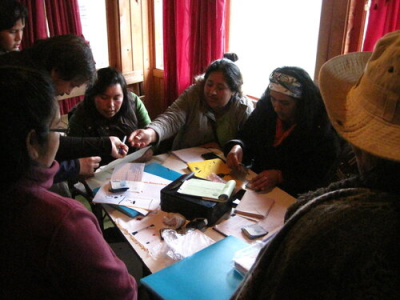Indigenous-led Economic Codesign

The final presentation in the CERN online Liviana conference was on the theme of Indigenous-led economic codesign, and was presented by Community Economy Research Network members Alison Guzman and Ignacio Krell who reflected on the process of working with the Mapuche-Lafkenche people of Lof Llaguepulli in the Lake Budi area of Chile to establish the Grupo de Apoyo Mutuo (or Mutual Support Group) that would serve the lives, lands, and values of the community.
Guzman explained how the project began in 2012 when the Llaguepulli community started a dialogue with MAPLE Microdevelopment about a collaboration to develop a community-led financial model based on Indigenous values and protocols.
At the invitation of the Llaguepulli community, in the following year Guzman and Krell moved to the southern region of Lake Budi to work as allies and participate in co-designing and implementing the financial model.
Guzman and Krell highlighted two crucial features of the project.
First, the relationship between MAPLE and the Llaguepulli community was based on Article 4 of the United Nations Declaration of the Rights of Indigenous Peoples which recognises that Indigenous peoples have to right to develop their own ways and means of economic autonomy, and this commitment was enacted through strategies such as adhering to the principles of Mapuche Az Mapu (Mapuche cultural norms and protocols) and being guided by a Council of Traditional Authorities.
Second, the financial model aimed to strengthen the Llaguepulli community through a sustainable and self-managed community financing tool that would reflect the Mapuche cultural context and support members’ everyday economic practices.
The resulting Grupo de Apoyo Mutuo (Mutual Support Group) is now managed and owned by the Mapuche people of Llaguepulli and it provides three main services: a savings program; initiative and emergency loans; and support for trafkintu and mingako activities.
Through the savings program, families collectivise their monetary resources and this provides the pool of money for loans.
Decisions about loans, including the interest rate, are made at member assemblies where over 50 per cent of members must attend for decision-making to occur.
More than 40 initiative loans have been made to support initiatives such as family agriculture, tourism, and artisanal poultry or pig farming, and many smaller ‘emergency loans’ (up to the amount of a family’s yearly deposit) have been made.
Support for trafkintu and mingako activities means that members can deposit and exchange non-monetary goods and services such as seeds, labour and other family farm assets without the need for liquidity, as one community member related to Guzman and Krell “When they deliver these seeds of fava beans and peas, it is a way of doing trafkintu … one does not need money to pick up a couple of kilos of beans [at Grupo de Apoyo Mutuo], but rather you get them, and then you return them.”
Guzman and Krell described how the Indigenous-led economic codesign process aligns with four aspects of Community Economies approach, especially as articulated in Take Back the Economy, namely: starting with ‘where we are at’ by acknowledging and working with existing economic practices, leadership and decision-making processes; taking back markets to enable fair exchange of monetary and non-monetary resources; taking back finance to enable longer-term financial planning and shared financial decision-making; and commoning of monetary and non-monetary resources in order to strengthen cultural values.
Since embarking on the project with the Llaguepulli community, Guzman and Krell have founded MAPLE Microdevelopment Chile to continue this ‘slow development’ approach to working with other Mapuche-Lafkenche communities, and they interested in the applicability of this approach in other contexts.
There are a series of online resources relevant to this Indigenous-led economic codesign process, including:
- An Impact Evaluation Report on the Mutual Support Group, 2014-2018
- An article in the online Cultural Survival Quarterly Magazine on the role of women in revitalising the Mapuche economy
- A video on the Grupo de Apoyo Mutuo (Mutual Support Group)
- A video of the 2019 Forum on Co-Designing Models for Economic Resilience in Wallmapu (ancestral Mapuche territory in what is now Northern Patagonia of Chile and Argentina).
Additional videos are available on the MAPLE Microdevelopment Chile YouTube Channel.
Jenny Cameron
